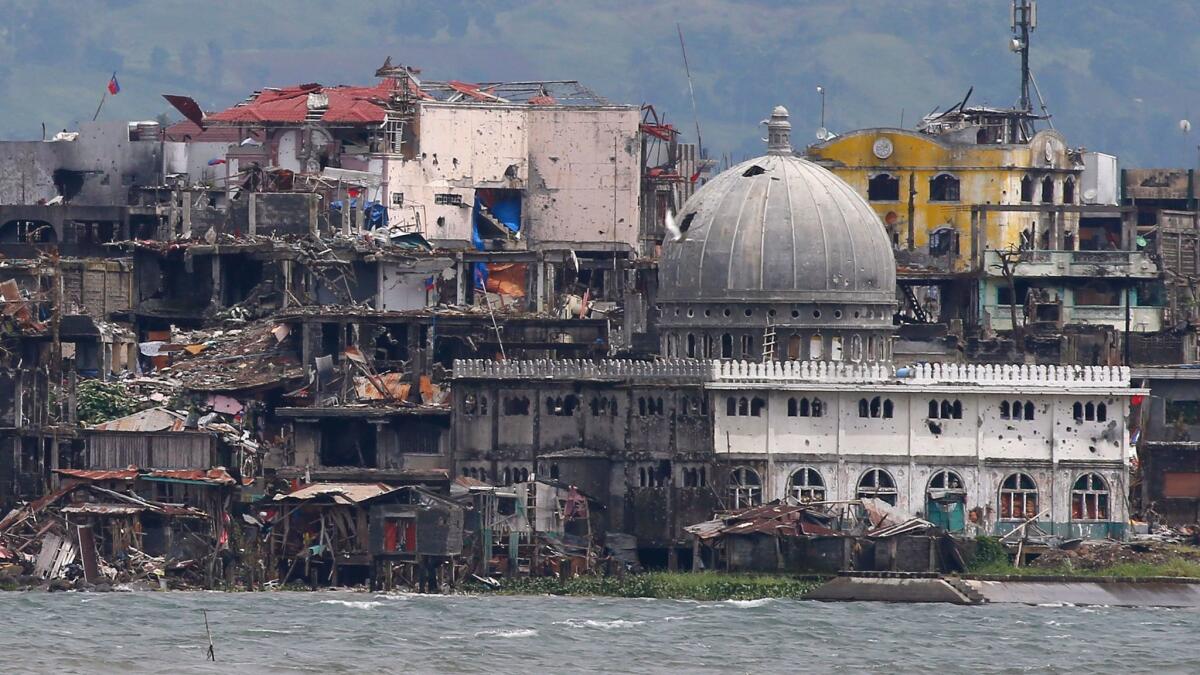A mostly Christian city in the Philippines lays out the welcome mat for displaced Muslims

- Share via
Reporting from CAGAYAN DE ORO, Philippines — Alyassa Macabaya fled his hometown of Marawi two months after fighting between government troops and Muslim rebels destroyed his house.
The Philippine government has since declared the combat over. But ask the 31-year-old tricycle taxi driver about going home, and he laughs. So do half a dozen other former neighbors standing around him at an evacuation shelter in the city of Cagayan de Oro, two hours away from their homes.
Most of them say they can’t safely return. The threat of violence still hangs over Marawi, where reconstruction has barely started. Nor do they have to go. The mayor of Cagayan de Oro decided to let the evacuees stay and has offered them an unusually broad array of services.
“We are not driving them from the city. They can stay as long as they want,” Mayor Oscar Moreno said. “Who knows, maybe some will settle down here.”
His decision is remarkable for a couple of reasons. First, such compassion has not been the norm in the Philippines under President Rodrigo Duterte, who has declared martial law on the island of Mindanao — where both cities are located — to bolster the fight against Islamist militants.
Second, the evacuees are overwhelmingly Muslim, and Cagayan de Oro, an industrial and agribusiness transport hub of 675,000, is a predominantly Christian town.

“We are in the same boat together,” Moreno said. “Our strategy was, given of course that many of our brothers in Marawi would be displaced, we visibly offered to accept them in Cagayan de Oro.”
Troops opened fire in Marawi on May 23, targeting the 4-year-old Maute group of rebels, who are inspired by the militant group Islamic State. The rebels were suspected of working with Abu Sayyaf, another Islamic State-affiliated group that kidnaps and occasionally beheads foreign tourists. The fighting battered and burned about half of urban Marawi, a city of 200,000, before the government declared an end Oct. 24.
The battle killed more than 1,100 people, including 920 militants, in the latest deadly struggle between Islamist rebels and government forces in the Philippines.
Twenty Islamist rebel groups operate around Mindanao, the country’s southernmost major island. Perceptions that Philippine Muslims lack autonomy or a fair share of resources after 500 years of settlement have led to clashes that have left 121,000 people dead since the 1960s.
Some foreign governments, including Canada and the United States, advise their citizens to avoid the island of 21 million people. Moreno is hoping that Mindanao can move past the conflict.
“What happened in Marawi will hopefully become a wake-up call for Mindanao,” the lawyer and former member of the Philippine Congress said.
Some permanent inhabitants of Cagayan de Oro at first questioned the city’s outreach to evacuees because they associated Muslims with violence, city social welfare officer Teodoro Sabuga-a said. The city received numerous tips about purported terrorism connections, he said.
“In fact, there are some Cayaganos who called my attention, ‘What are you doing?’ — as if there might be something that will happen,” he said. “But I said it’s already an instruction of the mayor that we have to accommodate them.”
Macabaya’s family and 43 others have lived up to half a year in the shelter in Cagayan de Oro, which the city built on a hilltop so it would be safe during floods. The city provides three halal meals a day and $4 in daily spending money.
Evacuees can use a prayer room, as well as volleyball and basketball courts just offsite. Their children may legally attend public schools in the host city, and a few of the displaced now work, selling goods in a local market.
“My house is destroyed and [I have] no place to live,” Macabaya said one weekday afternoon after a volleyball workout. He described shelter life as happy.
Eight families from the evacuation shelter had returned to parts of Marawi as of mid-November after government security advisors declared their neighborhoods safe.

However, most of the 19,000 people who reached Cagayan de Oro still live there with extended family. The city has offered them temporary ID cards, spaces for their children in public schools and in some cases resettlement in the shelter when family living didn’t work out.
Aid is flowing in. A local Catholic diocese, the central government, Philippine charities and private companies are among 12 major relief donors for Cagayan de Oro’s evacuees. One shelter resident, Aman Dayamla, 28, who has passed the months playing chess and volleyball, praised the effort. The donors, he said, “didn’t miss any assistance.”
At International School Cagayan de Oro, students and teachers are organizing a year-end holiday party for as many as 400 displaced children. The high school students have massed enough donated clothes and toys for those children to fill a classroom, school President Rhona Canoy said.
Still, a lot of children from Marawi avoid Cagayan de Oro schools because of fear of bullying, she said.
Shelter life can be trying. At least two families live in each room, all on foam mats. Larger rooms accommodate five families, who use laundry lines as privacy barriers. One woman was raising a 3-month-old baby in a room for 10.
But evacuees are staying in Cagayan de Oro largely to learn how the central government budget secretary will allocate $392 million for rebuilding Marawi as pledged through 2019. That amount is less than half the total estimated cost.
At least three other locations also have accepted some of the estimated 364,000 evacuees from Marawi and its outskirts. Cagayan de Oro stands out as a regional transit hub, making aid easy to receive, and for its history of domestic in-migration that has instilled a tolerance for outsiders, the mayor said.
“We are some sort of a clearinghouse,” he said. But, he added, “it’s the desire, the concern, the compassion that counts.”
Jennings is a special correspondent.
ALSO
A Muslim landowner in the Philippines took in Christians to protect them from Islamist extremists
A 40% price cut hasn’t helped Uber in Africa’s biggest economy
More to Read
Sign up for Essential California
The most important California stories and recommendations in your inbox every morning.
You may occasionally receive promotional content from the Los Angeles Times.










